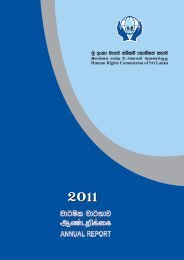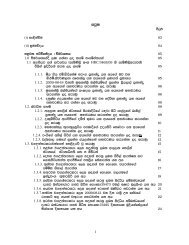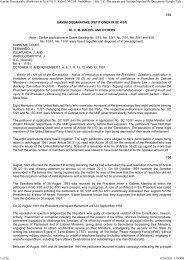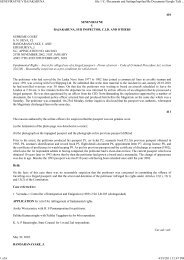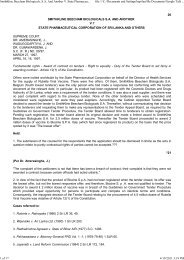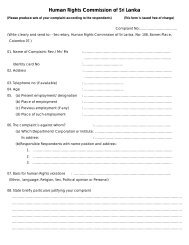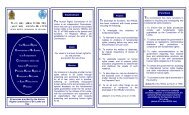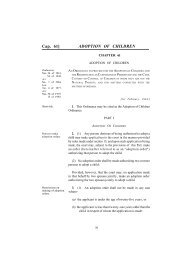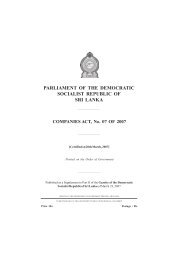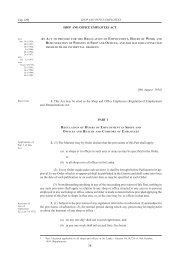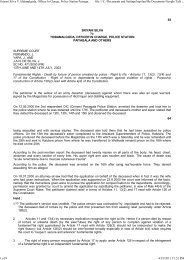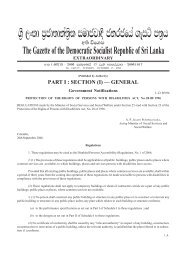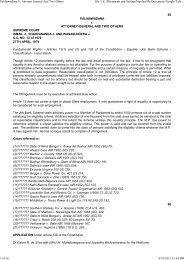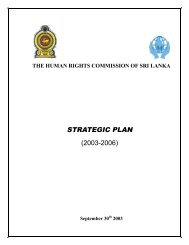Namasivayam V. Gunawardena
Namasivayam V. Gunawardena
Namasivayam V. Gunawardena
Create successful ePaper yourself
Turn your PDF publications into a flip-book with our unique Google optimized e-Paper software.
<strong>Namasivayam</strong> V. <strong>Gunawardena</strong> file:///C:/Documents and Settings/kapilan/My Documents/Google Talk ...<br />
justify their suspicion, yet it cannot be said that in the conditions prevailing in the; country their suspicion was not<br />
reasonable.<br />
Counsel for the Petitioner submitted that the detention order 'A' made on 5.8.1986 under the Emergency Regulations<br />
dated 18.7.86 was valid only upto 18.8.86. The said regulations were in operation for a period of one month from the<br />
date of the making thereof and hence were' valid only till 18.8.86. He submitted that a new detention order had to be<br />
made in terms of the new set of regulations to lend validity to the detention of the petitioner. Regulation 19(2)<br />
provides that a person detained in pursuance of the provisions of regulation 18 ... may be so detained for a period<br />
not exceeding ninety days reckoned from date of his arrest under the regulation and shall at the end of the period be<br />
released by the officer in charge of that place unless such person has been produced by such officer before the<br />
expiry of that period before a Court of competent jurisdiction.<br />
Article 155(5) of the Constitution provides that-<br />
"Where the provisions of nay law relating to public security have been brought into operation by the making of<br />
a Proclamation under such law, (the Public Security Ordinance) such Proclamation shall, subject to<br />
the provisions of Article 155(6), be in operation for a period of one month from the date of the<br />
making thereof, but without prejudice to the earlier revocation of such. Proclamation or to the making<br />
of a further Proclamation at or before the end of the period."<br />
Section 4 of the Public Security Ordinance provides, inter alia, that ‑<br />
"the expiry of revocation of any Proclamation under section 2 of the Public Security<br />
Ordinance shall not affect or be deemed to have affected ‑<br />
(a) the past operation of any thing duly done or suffered to be done under Part II of the<br />
Ordinance, while that Part was in operation;<br />
(b) any offence committed, or any right, liberty or penalty<br />
acquired or incurred while that Part was in operation."<br />
This liability to be detained for a period of, ninety days was the penalty incurred by the Petitioner under the<br />
Emergency Regulations current between 18.7.86 and 18.8.86: The expiry of the said Regulations does not therefore<br />
affect the detention order under which the Petitioner was held. In view of the aforesaid provisions of the law I do not<br />
agree with the apparently plausible submission of Counsel, that the detention order cannot survive the emergency<br />
regulation under which it was made.<br />
Counsel for the Petitioner objected to the admission of the reception of the affidavits filed by the<br />
Respondents on the ground that they were not filed within time specified by Rule 65(4) (2) of the Supreme Court<br />
Rules of 1978. Counsel pointed to the mandatory nature of the Rule and urged that an affidavit or objection filed<br />
outside the time stipulated by the Rule is not in compliance with the Rule and should not be admitted.<br />
The aforesaid Rule 65(4) provides‑<br />
"Upon leave being granted a notice of the application together with a copy of the written<br />
submissions shall be given forthwith by the Registrar to each of the Respondents other than the<br />
Attorney‑General, and each such Respondent may, within seven days of the service of such notice<br />
and written submissions, file counter‑affidavit and counter‑submissions with notice to the Petitioner.<br />
Any further written submissions by any part shall be permitted only at the discretion of the Court."<br />
In this case notice of the Petitioner's application was served on the Respondents on or about the 24.10.86.<br />
The Attorney General on 30.10.86 filed proxy and moved for time to file objections. But the other Respondents' did<br />
not file proxy or did not ask for time to file objections, within the seven days of the service of the notice on them. On<br />
7.11.86, the Attorney‑at‑law for the 1 st , 2 nd and 3 rd Respondents filed his proxy and moved "as it was .not possible<br />
for the 1 st , 2 nd and 3 rd Respondents to obtain necessary material to prepare and file counter affidavits, I respectfully<br />
move that this Court be pleased to grant further 2 weeks time to file counter affidavit." The Chief Justice acceded to<br />
the request of the Respondents and granted further time to file counter affidavits.<br />
I agree With the Counsel for the Petitioners that if the Respondent did not file their affidavits and written<br />
submissions within the time specified by the above Regulation, they are not entitled to claim that their affidavits and<br />
5 of 6 4/19/2011 2:40 PM<br />
403<br />
404



